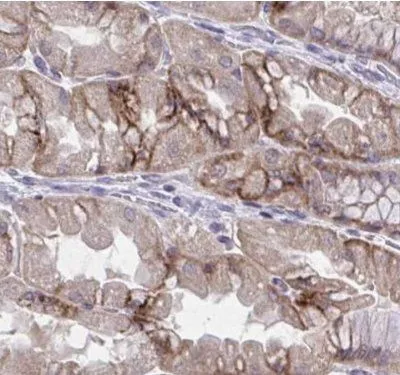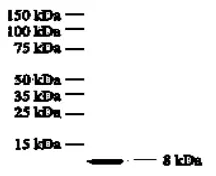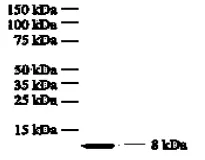![Sandwich ELISA analysis of human IL-8 (CXCL8) protein using GTX03037 CXCL8 / IL8 antibody [MT8H6] as coating antibody and GTX02918-02 CXCL8 / IL8 antibody [MT8F19] (Biotin) as detecting antibody. Substrate : pNPP Sandwich ELISA analysis of human IL-8 (CXCL8) protein using GTX03037 CXCL8 / IL8 antibody [MT8H6] as coating antibody and GTX02918-02 CXCL8 / IL8 antibody [MT8F19] (Biotin) as detecting antibody. Substrate : pNPP](https://www.genetex.com/upload/website/prouct_img/normal/GTX02918-02/GTX02918-02_20210507_ELISA_w_23053123_327.webp)
Sandwich ELISA analysis of human IL-8 (CXCL8) protein using GTX03037 CXCL8 / IL8 antibody [MT8H6] as coating antibody and GTX02918-02 CXCL8 / IL8 antibody [MT8F19] (Biotin) as detecting antibody. Substrate : pNPP
CXCL8 / IL8 antibody [MT8F19] (Biotin)
GTX02918-02
ApplicationsELISA
Product group Antibodies
TargetCXCL8
Overview
- SupplierGeneTex
- Product NameCXCL8 / IL8 antibody [MT8F19] (Biotin)
- Delivery Days Customer9
- Application Supplier Note*Optimal dilutions/concentrations should be determined by the researcher.Not tested in other applications.
- ApplicationsELISA
- CertificationResearch Use Only
- ClonalityMonoclonal
- Clone IDMT8F19
- Concentration0.5 mg/ml
- ConjugateBiotin
- Gene ID3576
- Target nameCXCL8
- Target descriptionC-X-C motif chemokine ligand 8
- Target synonymsalveolar macrophage chemotactic factor I; beta endothelial cell-derived neutrophil activating peptide; beta-thromboglobulin-like protein; chemokine (C-X-C motif) ligand 8; emoctakin; GCP1; GCP-1; granulocyte chemotactic protein 1; IL8; interleukin 8; interleukin-8; LECT; LUCT; lung giant cell carcinoma-derived chemotactic protein; lymphocyte derived neutrophil activating peptide; LYNAP; MDNCF; MONAP; monocyte-derived neutrophil chemotactic factor; monocyte-derived neutrophil-activating peptide; NAF; NAP1; NAP-1; neutrophil-activating peptide 1; SCYB8; small inducible cytokine subfamily B, member 8; T-cell chemotactic factor; tumor necrosis factor-induced gene 1
- HostMouse
- IsotypeIgG1
- Protein IDP10145
- Protein NameInterleukin-8
- Scientific DescriptionThe protein encoded by this gene is a member of the CXC chemokine family and is a major mediator of the inflammatory response. The encoded protein is secreted primarily by neutrophils, where it serves as a chemotactic factor by guiding the neutrophils to the site of infection. This chemokine is also a potent angiogenic factor. This gene is believed to play a role in the pathogenesis of bronchiolitis, a common respiratory tract disease caused by viral infection. This gene and other members of the CXC chemokine gene family form a gene cluster in a region of chromosome 4q. [provided by RefSeq, Aug 2017]
- Storage Instruction-20°C or -80°C,2°C to 8°C
- UNSPSC12352203



![WB analysis of IL8 recombinant protein using GTX83239 CXCL8 / IL8 antibody [3E4D8].](https://www.genetex.com/upload/website/prouct_img/normal/GTX83239/GTX83239_20170912_WB_w_23061322_344.webp)
![ICC/IF analysis of U-87 MG cells treated 1 uM thapsigargin for 24 hours using GTX15763 CXCL8 / IL8 antibody [3IL8-H10]. Panel e is untreated cell with no signal. Panel f represents control cells with no primary antibody to assess background. Green : Primary antibody Blue : Nuclei Red : Actin Fixation : 4% paraformaldehyde Permeabilization : 0.1% Triton X-100 for 10 minute](https://www.genetex.com/upload/website/prouct_img/normal/GTX15763/GTX15763_298_ICC-IF_w_23060620_274.webp)



![Sandwich ELISA analysis of bovine IL-8 (CXCL8) protein using GTX03037 CXCL8 / IL8 antibody [MT8H6] as coating antibody and GTX02917-02 CXCL8 / IL8 antibody [26E5] (Biotin) as detecting antibody. Substrate : pNPP](https://www.genetex.com/upload/website/prouct_img/normal/GTX02917-02/GTX02917-02_20210507_ELISA_w_23053123_975.webp)
![Sandwich ELISA analysis of human IL-8 (CXCL8) protein using GTX03037 CXCL8 / IL8 antibody [MT8H6] as coating antibody and GTX02918-02 CXCL8 / IL8 antibody [MT8F19] (Biotin) as detecting antibody. Substrate : pNPP](https://www.genetex.com/upload/website/prouct_img/normal/GTX03037/GTX03037_20210507_ELISA_1_w_23053123_306.webp)